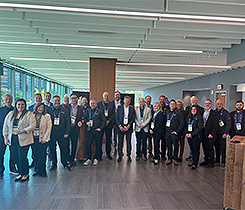Making the future, today
This is the sixth in a series on business topics inspired by the 20th century business management icon Peter Drucker.
Most propane managers tend to manage their business for the reality of yesterday. We often assume that past events will reoccur if we just wait for them.
 Carl Hughes |
For instance, do we keep extra transports on hand because we remember a time we couldn’t get reliable peak season hauling? Do we expect that the per-customer demands of past years will return once normal winter returns? Do we keep a strong appliance presence because that was how the business was built in the early days?
A major theme of all of Drucker’s writings is the importance of looking towards the future. These rich sets of thoughts are relevant to the propane industry because we tend see changes happening very slowly, both in a broad industry sense and in our own businesses.
“Working towards making the future is not to decide what should be done tomorrow, but what should be done today to have a tomorrow,” says Drucker.
There are two things we know for sure about the future of individual propane businesses. First, mortal man cannot know the future. Second, it will be different from what exists now and what we expect.
A common mistake in our individual businesses is we attempt to plan for the future by making predictions, and then build our businesses around those predictions. In the long run, making predictions can be futile or, worse, fatal.
The best we can do is anticipate the effects of events that have already happened. That’s what Drucker is talking about when he says it’s important to try to make the future happen. This skill is vital as we attempt to evolve our businesses into different businesses for a different future.
In addition to accepting that the future is unpredictable, we must understand that most of our efforts in our businesses are spent in solving yesterday’s problems.
The auto industry understands this well – today’s successful models were conceived and developed years ago, when other models were the top sellers. In the 1980’s, Chrysler correctly understood that the needs of the family had already evolved – so they created the first mini-van, meeting a need that had already happened.
A respected Southeastern propane retailer recently shared with me that he knows for a fact that his company’s average annual residential customer demand has dropped some 40 gallons over the last 10 years, adjusted for weather cycles. Understanding the effects of these changes that have already occurred will help this retailer shape his business model for the future.
Most of us are managing to yesterday’s realities. We expect normal demands to return. We expect normal wholesale prices to return. We expect that certain events will reoccur over time. We are looking for the next winter of 1989.
We would do better to understand today’s realities – in other words, look for the future that already exists – and plan for what should result.
A perfect example of where to start this process in our own businesses is to understand the changes that have already taken place in our own markets. Do you know what changes have taken place in your market in the last 10 years? Consider the following:
- Average age of household
- Average size of household
- Average household income
- Population trends by age groups
- Single and multi-family housing numbers
- Number of single households
- Adjustments to agricultural demands
- Industrial growth and job creation
Have you studied these available facts, or are you simply guessing from anecdotal evidence about what is going on in your markets? What are your assumptions about your own market? Are they valid? How and when were they determined? This type of data is available. Try Googling it!
Successful companies already embrace this ‘make the future happen today’ approach. Those successful companies often look like they can predict the future, when in fact they are simply a few steps ahead of the rest of us. Likewise, you should factor into your thinking that the future has already happened.
Carl Hughes is vice president of business development for Inergy LP. He can be reached at
Chughes@InergyServices.com
or 816-842-8181.
















